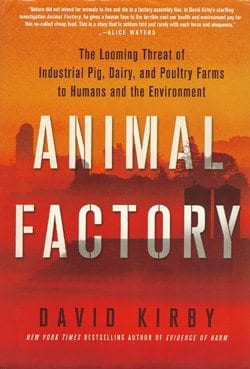
This year’s massive egg recall — which resulted in half a billion eggs being pulled from the nation’s supermarkets after a salmonella outbreak — was a wake-up call to the dangers of factory farming. The contaminated eggs resulted in more than 1,600 reported cases of salmonella poisoning and renewed calls for stricter food safety regulations.
In September, Congress launched a probe into the recall, leading to FDA inspections of the two responsible egg farms — Hillandale Farms and Wright County Egg, both in Iowa. FDA officials found filthy conditions that led to the food poisoning, including “chicken manure reaching eight feet high, employees who did not wear or change protective clothing when moving from one laying house to another, and many live mice throughout the facilities.”
Rep. Edward Markey, D-Mass., testified at the hearing, saying, “The jury is still out as to whether the Iowa facilities implicated in this infestation represent just a few rotten eggs or whether the safety of this country’s egg supply is more like Humpty Dumpty — shattered.”
David Kirby, author of “Animal Factory: The Looming Threat of Industrial Pig, Dairy, and Poultry Farms to Humans and the Environment,” would argue the latter. In his latest work, Kirby, contributing writing to the Huffington Post and author of the New York Times bestseller, “Evidence of Harm: Mercury in Vaccines and the Autism Epidemic — A Medical Controversy,” takes on the dangers of industrial meat in this harrowing expose on factory farms.
Kirby was first introduced to the topic of factory farms, euphemistically termed concentrated animal feeding operations (CAFOs), by Robert F. Kennedy Jr. several years ago. Kennedy, whom Kirby previously knew, told him about the situation in Prairie Grove, Ark. — kids living near chicken farms were dying of rare types of cancer. Investigation showed that farmers were putting arsenic, a known carcinogen, in the chicken feed to promote growth, and then using the arsenic-laced manure as fertilizer on land near homes and schools.
Kirby wanted to understand why someone would feed poison to animals — a question that led him to travel the country and document other stories about factory farming. He found that Prairie Grove residents were not alone.
In “Animal Factory,” Kirby chronicles the activism of Rick Dove, a retired colonel and commercial fisherman in North Carolina. In the 1980s he began noticing that millions of fish in the Neuse River were dying — and had strange sores on their bodies. Then, Dove noticed the same sores on his own body. With the help of his community, the fisherman soon found an explanation: hog CAFOs were dumping animal waste directly into the water.
CAFOs have replaced Old McDonald’s farm as the newest — and most widespread — model of protein production in the U.S. CAFOs put hundreds — if not thousands — of animals under a single roof with no access to the outdoors, where they spend their entire lives until slaughter. Proponents argue that these high-density operations increase production and drive down meat prices — the only way a double-patty hamburger can land on the McDonald’s dollar menu.
American CAFOs produce 100 times more waste than all human sewage plants in the country, and are responsible for millions of tons of contaminants entering the environment. But unlike human waste, animal matter is not treated, and its disposal is not carefully regulated.
In his book, Kirby also details similar stories from Washington and Illinois, showing that animal waste is not the problem of a few unlucky communities, but is an issue that plagues the entire CAFO industry.
In an interview with the Banner, Kirby explained that factory farms are not just an issue for rural communities, as they affect urban communities too. As the egg recall showed, food safety affects everyone — filthy CAFOs in Iowa can lead to food contamination in Boston.
Kirby also pointed to the power of agribusiness in Washington. Even though Massachusetts is not a farm state, the federal government is still heavily influenced by them. For instance, enormous amounts of tax dollars are used to provide cheap feed to CAFOs — money that could be used for other purposes.
But eating meat is not as clear-cut as organic, good, CAFO, bad, Kirby clarified — food from any farm can be dangerous and should be handled with care. That includes cooking all meat thoroughly, washing all surfaces that touch meat, washing hands, and making sure that raw meat does not come into contact with open cuts.
“It’s sad that we have to be so careful around our food,” he said.
Acknowledging the great expense and impracticality of eating exclusively non-CAFO meat, Kirby also suggested choosing just one protein to change — or reducing meat consumption altogether. In addition, consumers are also citizens, he says, and through voting and organizing, can put pressure on the White House to enforce stricter food safety regulations.
The U.S. government has not updated its food safety regulations since 1938, before CAFOs became widespread. But in 2009, the House overwhelmingly passed the Food Safety Enhancement Act, which would give federal regulatory bodies greater authority to enforce inspections and recalls. But the bill, which President Obama supports, is stalled in the Senate. Until then, food safety remains elusive.






